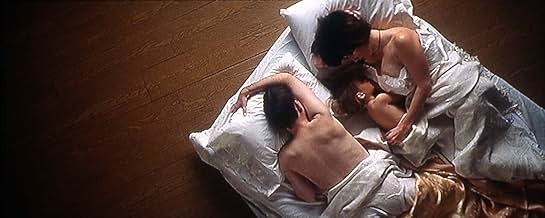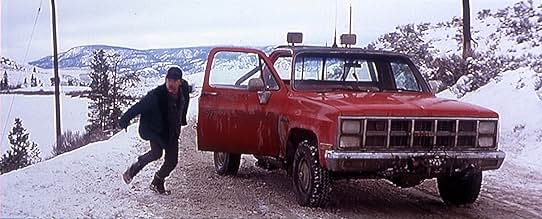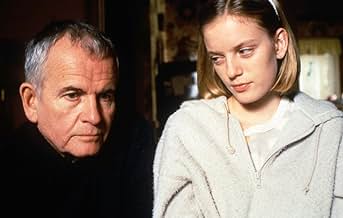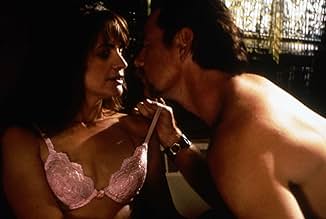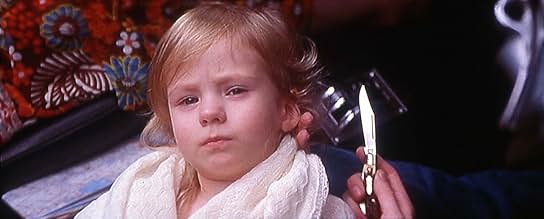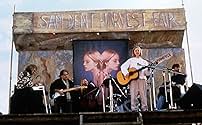IMDb रेटिंग
7.4/10
38 हज़ार
आपकी रेटिंग
एक छोटे से शहर में एक बस दुर्घटना परिवारों की रक्षा के लिए एक वकील को शहर में लाती है, लेकिन उसे पता चलता है कि सब कुछ वैसा नहीं है जैसा लगता है.एक छोटे से शहर में एक बस दुर्घटना परिवारों की रक्षा के लिए एक वकील को शहर में लाती है, लेकिन उसे पता चलता है कि सब कुछ वैसा नहीं है जैसा लगता है.एक छोटे से शहर में एक बस दुर्घटना परिवारों की रक्षा के लिए एक वकील को शहर में लाती है, लेकिन उसे पता चलता है कि सब कुछ वैसा नहीं है जैसा लगता है.
- 2 ऑस्कर के लिए नामांकित
- 34 जीत और कुल 56 नामांकन
फ़ीचर्ड समीक्षाएं
When it comes to drama, The Sweet Hereafter represents the finest cinema of the decade. The film lifts the director Atom Egoyan to the highest place of Canadian directors -right next to David Cronenberg. With extraordinary intelligence, Egoyan -the maker of "Exotica"- creates labyrinths of relationships. Brilliantly using flashbacks the director reveals the emotions of the characters to the viewers -a powerful way to make the audience feel anxiety.
The Sweet Hereafter is based on a novel by Russell Banks. This doesn't mean that Egoyan hasn't created a film that looks like his own creation. Very beautifully, even with a sense of poetry, the camera moves in a canadian small-town, a scenery full of snow. The nicely unusual music of Mychael Danna creates the mood when a lawyer played by Ian Holm arrives to the town. A School bus lies under ice, and the lawyer is invited to sue someone for the loss of several children.
A very important slice of the scenario belongs to a school girl (Sarah Polley), who realizes that the grief of loss can't be eased by judging the cause of it. Also the other people of the town play a remarkable role in the script.
Egoyan speaks clearly, but with a sound of personality, about the need of love, the pain of loneliness and the crossing of emotional obstacles. Fortunately someone knows how to direct interesting movies with elements of drama in them. The Sweet Hereafter possesses a brilliant structure where the visual telling breaths in the spirit of symbolism. I'm a very demanding viewer, a true cynic who always tries to find the worst sides of the film, but in this case I can't say anything negative.
The Sweet Hereafter is based on a novel by Russell Banks. This doesn't mean that Egoyan hasn't created a film that looks like his own creation. Very beautifully, even with a sense of poetry, the camera moves in a canadian small-town, a scenery full of snow. The nicely unusual music of Mychael Danna creates the mood when a lawyer played by Ian Holm arrives to the town. A School bus lies under ice, and the lawyer is invited to sue someone for the loss of several children.
A very important slice of the scenario belongs to a school girl (Sarah Polley), who realizes that the grief of loss can't be eased by judging the cause of it. Also the other people of the town play a remarkable role in the script.
Egoyan speaks clearly, but with a sound of personality, about the need of love, the pain of loneliness and the crossing of emotional obstacles. Fortunately someone knows how to direct interesting movies with elements of drama in them. The Sweet Hereafter possesses a brilliant structure where the visual telling breaths in the spirit of symbolism. I'm a very demanding viewer, a true cynic who always tries to find the worst sides of the film, but in this case I can't say anything negative.
Atom Egoyan's, The Sweet Hereafter is a film about loss and recovery. An accident involving a school bus in snowy Canadian roads has left a small town devastated which left many children dead.
The grieving parents are visited by a no win no fee lawyer, Mitchell Stevens (Ian Holm.) He is a partner in a law firm and he might be just doing his job but it seems to be without much vigour or conviction. I am not sure whether money is even a motivation for him. Stevens own daughter is a drug addict who only contacts him when she wants money for more drugs. Apart from that she hates him and he knows he has lost her.
He persuades some of the parents to file a class action lawsuit by claiming the design or construction of the bus was faulty.
The grieving parents and some of the survivors all have some secret. Did bus driver Dolores Driscoll (Gabrielle Rose) drive too fast or drive carelessly given the road conditions? Does Nicole Burnell (Sarah Polly) one of the kids paralysed below the waist might want to take revenge on her abusive father?
One of the parent, Billy (Bruce Greenwood) who was following the bus and waving at his children is against the lawsuit and wants the others to drop it.
The film does not start with the crash. It is told in non chronological order and we have several story strands. one of them is the use of 'The Pied Piper of Hamelin' which draws parallels of a town suffering from the loss of its children. Maybe Stevens will lead the townsfolk out of the darkness but he is suffering as well when he recounts his struggle with his drug addict daughter to one of her old friends he meets in a plane journey.
The film is about grief, sadness and the tortuous journey to recovery. Unfortunately the film does not always flow well and although I understand why some people would want to sue for damages, I never really understood why Billy did not want to sue? Nicole is paralysed, money would be useful to her and help her.
The grieving parents are visited by a no win no fee lawyer, Mitchell Stevens (Ian Holm.) He is a partner in a law firm and he might be just doing his job but it seems to be without much vigour or conviction. I am not sure whether money is even a motivation for him. Stevens own daughter is a drug addict who only contacts him when she wants money for more drugs. Apart from that she hates him and he knows he has lost her.
He persuades some of the parents to file a class action lawsuit by claiming the design or construction of the bus was faulty.
The grieving parents and some of the survivors all have some secret. Did bus driver Dolores Driscoll (Gabrielle Rose) drive too fast or drive carelessly given the road conditions? Does Nicole Burnell (Sarah Polly) one of the kids paralysed below the waist might want to take revenge on her abusive father?
One of the parent, Billy (Bruce Greenwood) who was following the bus and waving at his children is against the lawsuit and wants the others to drop it.
The film does not start with the crash. It is told in non chronological order and we have several story strands. one of them is the use of 'The Pied Piper of Hamelin' which draws parallels of a town suffering from the loss of its children. Maybe Stevens will lead the townsfolk out of the darkness but he is suffering as well when he recounts his struggle with his drug addict daughter to one of her old friends he meets in a plane journey.
The film is about grief, sadness and the tortuous journey to recovery. Unfortunately the film does not always flow well and although I understand why some people would want to sue for damages, I never really understood why Billy did not want to sue? Nicole is paralysed, money would be useful to her and help her.
Mitchell Stephens (Ian Holm) is a lawyer struggling with his drug addicted daughter. He's trying to convince various parents to sue the town. They lost their children when the school bus driven by Dolores Driscoll (Gabrielle Rose) gets into an accident on a snow covered road. The town is the only one with deep pockets and Mitchell will say anything to get them to sue. Nicole Burnell (Sarah Polley) is a survivor who was sexually corrupted by her father.
This movie meanders a lot. There are long flashbacks of not only the bus ride and crash but also some of the life before that day. It has an ethereal dreamlike quality about it. It has the sad moody devastation. It doesn't make it a compelling watch unless seeing the saddest people in the world is fun for you.
This movie meanders a lot. There are long flashbacks of not only the bus ride and crash but also some of the life before that day. It has an ethereal dreamlike quality about it. It has the sad moody devastation. It doesn't make it a compelling watch unless seeing the saddest people in the world is fun for you.
I had to laugh or else I'd cry and not because a bus full of school children died.
I honestly can't imagine anyone being moved by this film. It is too distant to be involving, too vague to be meaningful, too slow to be engaging and too cold to be emotional. But boy, oh boy, is it funny.
The dialogue is so odd and unnatural that it becomes comical. Note the stagy way in which the detective's daughter talks. `Welcome to hard times, DADDY', `I like it when you don't believe me DADDY.' Come on, playing a drug addict is easy just watch Courtney Love and imitate. Zoe doesn't sound drugged out but she must be because she always calls from a payphone where police sirens blast in the background. And Zoe comes off well in comparison to the unintentionally hilarious stroke victim and the Otto's who put their heads together, dry-eyed and sniffle, expecting us to believe that they are crying over their long lost son named, Bear, of all things.
Bravo to the generic and lifeless Sarah Polley who musters a tiny ounce of oomph to deliver `the big lie' at the end you know, the one she said she would NEVER tell. She even attempts to glare at her father and later; if you look really close, it's the beginnings of a grin.
How ridiculous is the scene where Ian Holm recounts a spider bite story that goes absolutely NOWHERE? Why doesn't he remember Alison's father? Why does he get stuck in a CAR WASH? What is wrong with this guy?
And why is creepy Billy a saint for trying to convince Nicole's father not to sue? This anti-sue-happy town sure is unrealistic. Oh, they're Canadian. Thank explains it. Sure Ian Holm's acting is bad but does he really deserve the town's wrath for trying to gain a buck?
There is a really cheesy time transition scene, which illustrates how confused director Atom Egoyan is. He thinks the audience needs to be hand held in order to comprehend the passing of time and yet he fails to explain anything else in this perplexing tale with similar clarity.
Would people really behave the way these people do and what does it all mean anyway? Detective Stephens says that our children are all lost to us. The Pied Piper story echoes similar sentiments. Some school kids are dead while others grow up to become drug addicts and are as good as gone. One strange girl lives and because she tells a lie she is now, apparently, more pure than anyone else in town and well, that's it.
It is always wise to heed the immortal words of Radiohead don't get sentimental, it always ends up drivel. The Sweet Hereafter doesn't even have enough power to illicit the feelings that sentimentality requires. It is the worst kind of drivel -the kind that attempts to be profound, fails and stumbles into pretension, leaving nothing worthy of redemption in its wake.
I honestly can't imagine anyone being moved by this film. It is too distant to be involving, too vague to be meaningful, too slow to be engaging and too cold to be emotional. But boy, oh boy, is it funny.
The dialogue is so odd and unnatural that it becomes comical. Note the stagy way in which the detective's daughter talks. `Welcome to hard times, DADDY', `I like it when you don't believe me DADDY.' Come on, playing a drug addict is easy just watch Courtney Love and imitate. Zoe doesn't sound drugged out but she must be because she always calls from a payphone where police sirens blast in the background. And Zoe comes off well in comparison to the unintentionally hilarious stroke victim and the Otto's who put their heads together, dry-eyed and sniffle, expecting us to believe that they are crying over their long lost son named, Bear, of all things.
Bravo to the generic and lifeless Sarah Polley who musters a tiny ounce of oomph to deliver `the big lie' at the end you know, the one she said she would NEVER tell. She even attempts to glare at her father and later; if you look really close, it's the beginnings of a grin.
How ridiculous is the scene where Ian Holm recounts a spider bite story that goes absolutely NOWHERE? Why doesn't he remember Alison's father? Why does he get stuck in a CAR WASH? What is wrong with this guy?
And why is creepy Billy a saint for trying to convince Nicole's father not to sue? This anti-sue-happy town sure is unrealistic. Oh, they're Canadian. Thank explains it. Sure Ian Holm's acting is bad but does he really deserve the town's wrath for trying to gain a buck?
There is a really cheesy time transition scene, which illustrates how confused director Atom Egoyan is. He thinks the audience needs to be hand held in order to comprehend the passing of time and yet he fails to explain anything else in this perplexing tale with similar clarity.
Would people really behave the way these people do and what does it all mean anyway? Detective Stephens says that our children are all lost to us. The Pied Piper story echoes similar sentiments. Some school kids are dead while others grow up to become drug addicts and are as good as gone. One strange girl lives and because she tells a lie she is now, apparently, more pure than anyone else in town and well, that's it.
It is always wise to heed the immortal words of Radiohead don't get sentimental, it always ends up drivel. The Sweet Hereafter doesn't even have enough power to illicit the feelings that sentimentality requires. It is the worst kind of drivel -the kind that attempts to be profound, fails and stumbles into pretension, leaving nothing worthy of redemption in its wake.
I've seen this film twice now, and had the same reaction both times, so it's not out of gut reaction that I label "The Sweet Hereafer" an odious piece of simple-minded garbage.
The central idea (a school bus crash) has such intrinsic emotional repercussions that I can see how most viewers are washed away in grief enough to not notice the emptiness of the conceit built around it.
As an intruding lawyer, Ian Holm is asked to give a performance of staggeringly self-conscious falseness in which his every word, movement and breath is meant to project "SOMETHING IMPORTANT". His episodic encounters with the people of the community in which the accident took place only reveals Egoyan's total condescension toward life's "little people", presenting them as simpletons who, gosh darn it, love their children and each other and turn their noses up at anything so disgusting as a dollar bill.
In a failed attempt to make at least one character two-dimensional, a subplot is slopped on about the lawyer losing touch with his own child, the most ridiculous drug-addicted banshee every put on film.
Toss in heavy-handed allegories, heart-tugging muzak and trite conclusions, and what have you got? An award-winning "masterpiece", to hear most people talk. More likely they woke up the next morning, remembered something about angelic children heading for their final bus ride, and forgot the manipulative banality of the rest.
View the first episode of Krzysztof Kieslowski's 1988 "Decalogue", which covers similar thematic ground and, in 50 short minutes, accomplishes worlds more.
3 out of 10 for nice work by actors Bruce Greenwood and Sarah Polley.
The central idea (a school bus crash) has such intrinsic emotional repercussions that I can see how most viewers are washed away in grief enough to not notice the emptiness of the conceit built around it.
As an intruding lawyer, Ian Holm is asked to give a performance of staggeringly self-conscious falseness in which his every word, movement and breath is meant to project "SOMETHING IMPORTANT". His episodic encounters with the people of the community in which the accident took place only reveals Egoyan's total condescension toward life's "little people", presenting them as simpletons who, gosh darn it, love their children and each other and turn their noses up at anything so disgusting as a dollar bill.
In a failed attempt to make at least one character two-dimensional, a subplot is slopped on about the lawyer losing touch with his own child, the most ridiculous drug-addicted banshee every put on film.
Toss in heavy-handed allegories, heart-tugging muzak and trite conclusions, and what have you got? An award-winning "masterpiece", to hear most people talk. More likely they woke up the next morning, remembered something about angelic children heading for their final bus ride, and forgot the manipulative banality of the rest.
View the first episode of Krzysztof Kieslowski's 1988 "Decalogue", which covers similar thematic ground and, in 50 short minutes, accomplishes worlds more.
3 out of 10 for nice work by actors Bruce Greenwood and Sarah Polley.
क्या आपको पता है
- ट्रिवियाAs indicated on writer and director Atom Egoyan's commentary track on the DVD, many people ask about the odd mask worn by the notetaker during the deposition scene. This is a stenographer's mask, an item which is used in real life by a stenographer to record his or her own voice during the deposition.
- गूफ़When Stephens visits the Ottos, and Mr. Otto offers him some tea, we hear a tea kettle whistling but the one we see on the wood stove is not the whistling type, and there is no steam coming from the kettle.
- भाव
Mitchell Stephens: You'd make a good poker player, kid.
- साउंडट्रैकOne More Colour
Words and Music by Jane Siberry
Courtesy of Wing in Music/Red Sky Music
Arranged by Mychael Danna
Vocal by Sarah Polley
Performed by The Sam Dent Band
टॉप पसंद
रेटिंग देने के लिए साइन-इन करें और वैयक्तिकृत सुझावों के लिए वॉचलिस्ट करें
- How long is The Sweet Hereafter?Alexa द्वारा संचालित
विवरण
बॉक्स ऑफ़िस
- बजट
- CA$50,00,000(अनुमानित)
- US और कनाडा में सकल
- $32,63,585
- US और कनाडा में पहले सप्ताह में कुल कमाई
- $31,149
- 12 अक्टू॰ 1997
- दुनिया भर में सकल
- $32,63,585
- चलने की अवधि1 घंटा 52 मिनट
- रंग
- ध्वनि मिश्रण
- पक्ष अनुपात
- 2.35 : 1
इस पेज में योगदान दें
किसी बदलाव का सुझाव दें या अनुपलब्ध कॉन्टेंट जोड़ें


